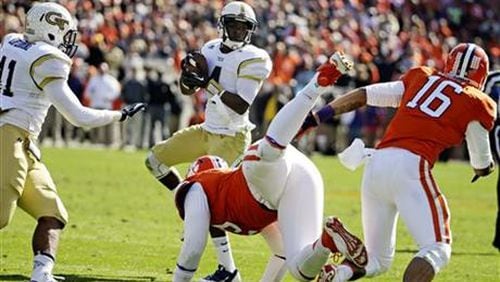Georgia Tech leads FBS in interceptions returned for touchdowns with five. It’s another representation of the almost unfathomable run of playmaking that the Yellow Jackets have put together this season.
Consider that Tech has its five touchdowns on 16 interceptions, 31.3 percent. I wouldn’t say the rate is off the charts, but it’s pretty high.
Tech spaced out its previous five touchdowns off interceptions over 36 interceptions. In 2012, a year when the Jackets seemed to play much of the season under a cloud – they lost two games in overtime after leading both in the final minute of regulation, you’ll remember, Al Groh was fired midseason, Dan Radakovich left for Clemson, fans kept falling out of the stands – they had 16 interceptions and returned just one for a touchdown. (Isaiah Johnson against BYU. Tech also failed to convert a third down in that game. So it wasn’t all bad breaks.)
In the ACC this season, about 16 percent of interceptions have been returned for scores. Last year, the rate was 11 percent and the year before it was 9 percent. Louisville leads FBS with 22 interceptions and has managed to get to the end zone once.
Further, as I wrote in the takeaways from the Clemson game (linked here , they've been a little hard to find), Tech's record books list eight games since 1961 in which the Jackets scored two defensive touchdowns. That's eight over 625 games from 1961 up to the Virginia game. The Jackets went 20 years at one point without a two-defensive touchdown game. Tech has had two in the past two games.
It’s not like the touchdowns have been fluky. Quayshawn Nealy made a smart play to pick off Tulane’s Tanner Lee. You wouldn’t pick P.J. Davis to return an interception to the end zone, but looking again at his 41-yard return for a score against Virginia Tech, it wasn’t necessarily exceptional. He caught it in the middle of the field and shot quickly downfield, got a block from Tyler Stargel and outran Michael Brewer.
D.J. White’s interception was a smart and aggressive read on a sideline route, and once he caught it, there was no one between him and the end zone. Jamal Golden’s return against Clemson was, again, a smart play aided by his video study. Chris Milton’s was perhaps the most difficult return in terms of evading tacklers.
An interesting thing about all five interception returns is how critical each was. Nealy’s tied the score at 14. Davis’ gave Tech a 17-16 lead over Virginia Tech, White’s triggered the 21-point second-quarter avalanche, Golden’s gave the Jackets a lead it never gave up and Milton’s closed the door on Clemson after the Tigers had recovered Zach Laskey’s fumble and had a chance to make it a one-possession game.
I don't think it means Tech is a "team of destiny." For one thing, the term is way overwrought, since, for one thing, a lot of times teams of destiny end up falling on their face. For instance, I imagine a lot of Auburn fans believed the Tigers were destined, and that didn’t quite work out the way they planned.
And this isn’t to suggest that Tech is tripping blindly into touchdowns. The points have been earned off playmaking, effort and preparation. For instance, Nealy was there to scoop up the ball after Tyler Marcordes knocked it loose from N.C. State quarterback Jacoby Brissett because he was pursuing the play.
It is a factor, too, that players like Nealy have excellent instincts and a playmaking knack. Nealy now has four defensive scores in his career. But I don't know if that explains everything.
Coach Paul Johnson has described the defense as “opportunistic.” It’s probably about as apt a word as there is.
About the Author







